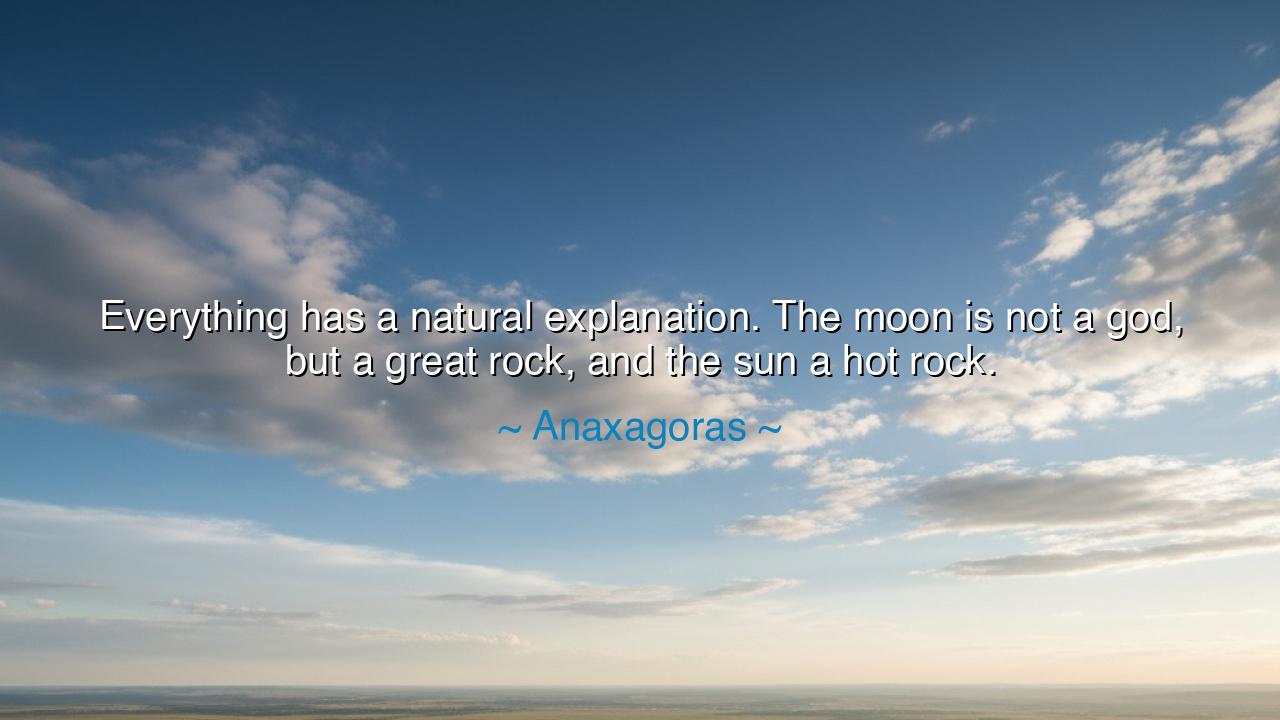
Everything has a natural explanation. The moon is not a god, but
Everything has a natural explanation. The moon is not a god, but a great rock, and the sun a hot rock.






The words of Anaxagoras, the pre-Socratic philosopher who dared to peer beyond the veil of myth, resonate with the clarity of reason: “Everything has a natural explanation. The moon is not a god, but a great rock, and the sun a hot rock.” In this declaration, he lifts the mind from superstition into the realm of inquiry and observation. Anaxagoras, living in the 5th century BCE, challenged the prevailing belief that celestial bodies were divine beings controlling the fate of humankind. Instead, he proclaimed that the universe, in all its grandeur, could be understood through reason, logic, and natural laws.
The origin of this quote lies in the bold intellectual awakening of Athens, a city of thinkers and seekers, where curiosity began to supplant unquestioned belief. Anaxagoras observed the heavens and the earth, the movement of stars, the phases of the moon, and the warmth of the sun, and he discerned that these phenomena obeyed natural principles, not divine caprice. By declaring that the moon and the sun are mere rocks, albeit extraordinary ones, he paved the way for a rational understanding of the cosmos, teaching that fear and reverence need not replace knowledge and observation.
At the heart of Anaxagoras’ teaching is the principle of cause and effect, the notion that every event has a reason rooted in the fabric of nature. He invited humanity to lift its gaze not in supplication alone, but in inquiry; to ask, to measure, to understand. The moon, he said, is a rock reflecting the sun’s light, not a deity exacting judgment. The sun is a fiery orb, not a god dispensing fortune or misfortune. In these words lies the empowerment of the human mind—the call to recognize that understanding is not sacrilege, but the highest form of reverence.
History provides striking examples of this principle in action. Consider Galileo Galilei, who centuries later peered through his telescope to observe the moons of Jupiter and the phases of Venus. Like Anaxagoras, Galileo challenged prevailing dogma, insisting that celestial phenomena followed natural laws rather than divine whim. Though he faced persecution for his insights, his courage reaffirmed the truth Anaxagoras proclaimed: knowledge arises from observation, study, and the fearless pursuit of evidence, even when it contradicts entrenched beliefs.
Anaxagoras’ teaching also carries a profound philosophical and emotional resonance. To assert that everything has a natural explanation is not to diminish wonder, but to deepen it. When one understands the cause of the tides, the phases of the moon, or the heat of the sun, one marvels not at divine caprice, but at the intricate and ordered beauty of the cosmos. Knowledge transforms fear into awe, superstition into curiosity, and passive acceptance into active engagement with the world.
The lesson for our lives is both practical and transformative. We are called to observe, question, and understand the world around us. When faced with uncertainty, confusion, or adversity, we may seek explanations not in fear or superstition, but in reasoned inquiry. Like Anaxagoras, we are invited to cultivate curiosity, patience, and courage, to confront the unknown with eyes wide open and minds alert. By embracing natural explanations, we gain not only understanding, but freedom from the tyranny of unfounded fear.
Furthermore, Anaxagoras’ insight reminds us to value evidence over dogma, exploration over passivity, and wisdom over blind reverence. The natural world, he teaches, is intelligible, not capricious; it rewards careful observation, thoughtful reflection, and courage in the face of misunderstanding. To live according to this philosophy is to approach life with humility, curiosity, and the recognition that mystery is a call to investigate, not a reason to despair.
Thus, the words of Anaxagoras endure as both guidance and inspiration: “Everything has a natural explanation. The moon is not a god, but a great rock, and the sun a hot rock.” Let them teach us to seek knowledge with courage, to question boldly yet reverently, and to celebrate the natural order of the universe. In doing so, we honor both the cosmos and our own capacity to understand it, transforming wonder into wisdom and superstition into enlightened curiosity.






AAdministratorAdministrator
Welcome, honored guests. Please leave a comment, we will respond soon